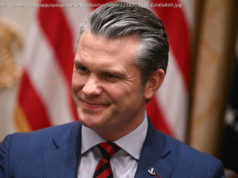Celebrities with mental illnesses are not curiosities to be observed and studied
The conversation surrounding Kanye West’s mental health during his visit to the White House raises some of the same issues of how the public scrutinizes celebrities with mental illnesses.
A Twitter user known as @cakefacedcutie tweeted out a photo in late June of Saturday Night Life star Pete Davidson arm in arm with his new girlfriend, the pop star Ariana Grande. Davidson’s face is obscured from the camera by the hood of his plaid jacket; Grande, licking a lollipop, gazes at him with adoration. Printed over Davidson’s face are the words “Men that need therapists”; Grande is annotated with the word “Me.”
The photo struck a nerve, rapidly racking up more than 30,000 retweets. It wasn’t hard to see why. Davidson, who has been open about being diagnosed with borderline personality disorder, and Grande spent the month of June in the news as their relationship progressed from new romance to cohabitation and engagement. Given that Davidson is open about living with borderline personality disorder, many found it easy to interpret his whirlwind romance as the product of mental illness.
Davidson isn’t the only celebrity with a mental illness who’s been in the media spotlight of late. A few weeks before Davidson and Grande got together, the openly bipolar Kanye West drew attention for a frenzied burst of Twitter activity and some shocking political statements. And in early June, Kate Spade and Anthony Bourdain, two celebrities who suffered from depression, died by suicide within a few days of each other.
As someone who lives with mental illness (specifically, a well-managed case of obsessive-compulsive disorder, or OCD), it’s frustrating to watch when the behavior of celebrities grappling with their mental health is treated as fodder for the celebrity gossip mill. Few outlets show any consideration for how their coverage contributes to misunderstandings and misinformation about mental illness, let alone how it affects the lives of the people who are the subjects of the articles.
Covering mental illness will always be a fraught endeavor. Most of us are more familiar with the stereotypes about mental illness than the facts, and people who live with mental illness deal with a stigma that positions them as unfixable, untrustworthy, and totally broken. As a result, coverage of mental health is often problematic.
But so long as celebrities’ personal lives are considered newsworthy, it’s a challenge we’ll have to deal with. So how do we in the general public and in the media talk about the mental health of celebrities in a way that’s respectful and thoughtful, and, above all, doesn’t actively harm both celebrities and everyday people dealing with mental illness?
When their antics are deemed entertaining, they’re egged on and encouraged; when they turn self-destructive, they’re chided for not taking better care of themselves. Mental illness most frequently enters the conversation in the wake of violence or suicide, reinforcing a bleak, simplistic portrayal of what is often a complex collection of conditions.
Frustratingly, most of the public demonstrates only the most superficial, sensationalistic understanding of what mental illnesses even are, one that’s frequently informed more by stereotype than by fact. (I may have OCD, but I’m not, as many believe, obsessed with counting or cleanliness — my OCD manifests as obsessive violent thoughts and worrying about social situations.) Because so many Americans follow celebrity news closely, these depictions are crucial in shaping how we all view mental illness generally.
It’s not hard to imagine that there must be a better way to write about these issues. But what might that look like?
Jenn Brandel, a social worker, thinks that a little bit of media training could go a long way. In media coverage of celebrity antics, it’s not uncommon for terms like “ manic episode ” or “borderline” to get thrown around as a shorthand for bad judgment and wild behavior, reinforcing negative stereotypes. Taking the time to define these terms, as they are used in a clinical context, can help chip away at this stigma.
Brandel also advises against presuming that every unconventional decision a person with mental illness makes is automatically connected to their diagnosis. Is Davidson’s whirlwind romance driven by some borderline personality disorder–influenced impulsivity, or Kanye’s Twitter meltdown an indication of a manic episode? Perhaps. But you don’t have to have a mental illness to engage in impulsive behavior, and plenty of people living with mental illness are thoughtful, kind, and well-behaved.
Treating someone’s mental illness as their primary decision-maker is reductive, and fuels the notion that people are defined by, and incapable of overcoming, their diagnosis — when it’s just one part of a multifaceted identity.
Because of this, it’s wrong to assume that someone is living with a mental illness just because you think they’re acting oddly. Casual armchair diagnoses of “bipolar” or “OCD” may seem harmless, but they rely on stereotypes that reinforce the stigma around mental illness.
People with mental illnesses are not curiosities to be observed and studied. Giving them — especially celebrities who have a large platform — the chance to share their perspective can offer much-needed nuance to our discussions of mental health.
Beyond the discussion of mental health, there’s a larger question of why we love to turn celebrities’ darkest moments into entertainment. It’s possible that writing off these public “meltdowns” as the byproduct of mental illness allows us to feel superior to the people who seem to have it all, that dismissing the powerful and wealthy as “crazy” helps us feel more secure in our own lives.
But that kind of attitude comes at a cost to our empathy — and our understanding of mental health in general. Perhaps it would be better if we stopped treating celebrities’ personal lives like a reality show, obsessing over every detail of their potentially unhealthy antics. You don’t have to have a mental illness to go on a Twitter rampage or make rash decisions about your romantic life, but if you do have such an illness, having those behaviors amped up by the media isn’t going to help.
Home
United States
USA — Events Kanye West and the damaging way we talk about celebrities and mental...






